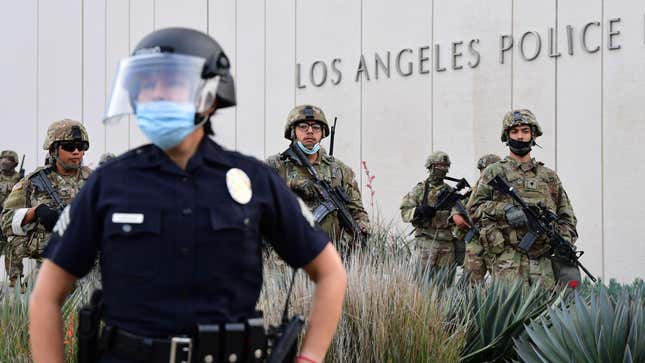
Los Angeles police officers who convinced their colleagues to purchase products from Amazon’s home security company, Ring, received compensation in the form of free and discounted Ring products, an arrangement that LAPD appears to deny violated any rules against officers accepting paid endorsements.
Citing emails between officers and company officials, the Los Angeles Times reports that Ring gave as many as 100 LAPD officers free or discounted devices in exchange for persuading others to sign up for Ring’s home surveillance service.
In some cases, the officers-turned-brand-ambassadors reportedly helped sell fellow officers on buying Ring products for themselves, raising questions about whether rules around accepting gifts or favors were violated. The LAPD’s code of ethics expressly prohibits officers from accepting gifts of any kind from anyone if it might “[reasonably] be interpreted as an attempt to influence their actions.”
Ring has sought partnerships with hundreds if not thousands of police departments across the country, including the LAPD. The arrangements usually involve police endorsing Ring publicly, if not carefully, to avoid violating rules that ban cops from behaving as salesmen.
In exchange, Ring provided the departments access to an online platform, which allowed them to solicit Ring camera footage directly from its customers—users of Ring crime-centric social media app, Neighbors.
Gizmodo previously reported on Ring offering police discounts in 2019. Police in Ewing, New Jersey, for example, were given codes for $50 off, emails show.
Ring’s law enforcement ambassador program—officially dubbed Pillar—was still in operation after retail giant Amazon acquired the company in 2018. It was ended the following year.
Emails from 2016 published by the LA Times show senior LAPD officers using their work email accounts to communicate with Ring’s sales staff. The officers were provided flyers, discount cards, and other marketing materials, along with a “promo code” that allowed Ring to track which officers moved the most product.
“If the code is used ten times then I will send you a Ring Video Doorbell for free. If the code is used 25 times I will send you a Ring Video Doorbell, Stick Up Cam, Solar Panel, chime and free cloud for a year for free,” a Ring employee wrote in one email to an LAPD officer.
In another email, a senior officer in LAPD’s Olympic Division is shown reporting back to Ring that he’d sold five of his fellow officers on purchasing Ring devices at a public safety fair. In another, an officer is seen agreeing to advertise on Ring’s behalf at a police picnic in which 200 guests were expected.
One detective of LAPD’s Rampart Division is seen informing Ring that while his “older” neighbors are wary of the devices, he’s “been keeping an eye out” for their kids, saying he plans to get them to convince their parents to buy the products.
At least 125 officers communicated with Ring, the LA Times reports, adding that “only occasionally” did officers question the ethics behind the ambassador program.
An LAPD spokesperson told the paper that a preliminary review of the emails showed no rules against paid endorsements had been violated because using discount codes is “generally not in conflict with our Codes of Ethics.”
Police officials endorsing Ring say its networked cameras not only discourage minor offenses like package theft but occasionally supply key evidence in cases of major crimes such as child abduction. Its detractors, meanwhile, say Ring is constructing a nationwide surveillance network unanswerable to communities and government.
Amazon’s push to make Ring indispensable to daily police work has drawn scrutiny from privacy and civil liberty groups alarmed by reports of its data-sharing practices and efforts to control what police departments say about its products.
Ring has sought to censor police statements to news outlets, requiring department officials to obtain its marketing team’s approval before commenting publicly. As Gizmodo reported in 2019, Ring had barred police in at least one city from using the word “surveillance” to describe its products, claiming the term was likely to evoke “user privacy concerns.”
The company has taken some practical steps to alleviate worries. After hackers accessed an unknown number of its customers’ cameras using stolen passwords in December 2019, Ring pushed users to adopt two-factor authentication—an extra security step that, ideally, requires physical access to the owner’s cellphone.
Most recently, Ring said it had removed the ability of police to contact its customers directly by email to request access to home footage—a process Ring had claimed was anonymous, but in practice could paint some residents as noncompliant. (Ring had once argued officers couldn’t know which residents had Ring cameras, though they are typically visible from the street and some customers have given police their addresses in exchange for free products and discounts.)
Departments are now limited to posting “requests for assistance” on their profile pages on Ring’s neighborhood watch app, which includes new safeguards to prevent users from mistakenly sharing footage outside the prescribed timeframe.